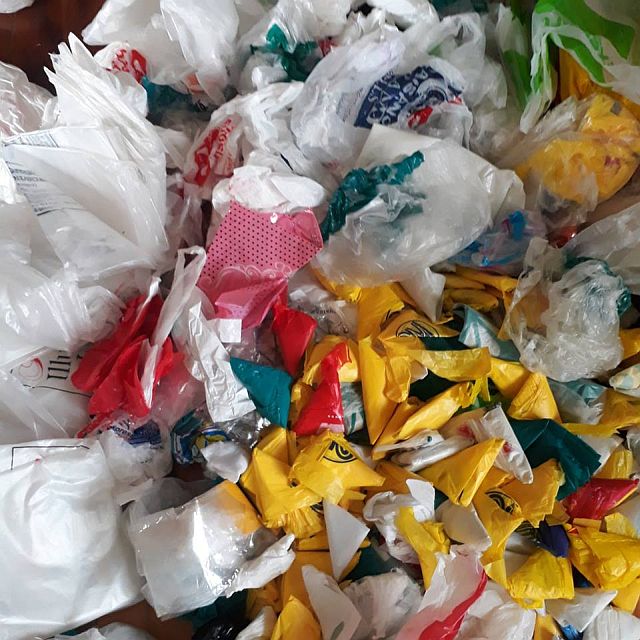
Marriel collected more than 200 plastic sando bags since March 13, which she would need to produce more backpacks. (Contributed Photo)
Trash to treasure” may be a cliché, but what it signifies is really what is direly needed today.
For 20-year-old Fine Arts student Marriel Colaljo a native of Naga City, Cebu, her advocacy of saving the earth through a plastic-free environment was the driving force behind the waterproof bags she produces out of plastic refuse.
An introverted senior Fine Arts major at the University of the Philippines Cebu, Marriel said that when it comes to her projects, she seldom talks about them.
But last March 8, Marriel posted a prototype of her study – a backpack made of plastic materials like grocery bags and straws.
The prototype was part of her undergraduate thesis requirement to complete her Fine Arts degree.
Marriel needed to produce at most three prototypes for her thesis’ board of panelists before June.
She thus needed the help of people through donations of plastic refuse, whether in a good condition or not, to be used as raw materials for her project.
In just hours, her Facebook post received more than 8,000 reactions, and people began to endorse Marriel’s causes as their own.
Environmental organizations all over the country such as the Youth for a Livable Cebu, STRAW Wars Philippines, and Plastic Free Bohol also expressed their support by helping her implement the study.
“I was surprised by so many people who were actually concerned about the impact of using plastic,” Marriel told CDN.
Since March 13, more than 200 cellophane bags were donated to Marriel, and will be recycled to create two more samples for her thesis.
Thesis idea
“I see plastics every day. I was disturbed that the consequences of plastic pollution have entered the food chain. Plastic pollution does not only affect the environment but also the well-being of humans, for we are all interconnected,” she said, adding that her thesis allowed her to learn more about plastic as a material.
Data collected by the national headquarters of the Department of Science and Technology (DOST) showed that garbage volume in Cebu City has significantly increased since 2006, from 61.36 tons of garbage to at least 500 tons in 2016. Furthermore, Cebu City’s garbage profile showed that for every 500 tons of garbage collected daily, around 10 to 16 percent is composed of plastic refuse.
“Plastic dependency is a daily and simple problem. But collectively and in huge numbers, it resulted to plastic pollution. In my study, I have to formulate and create a long-term solution for this big problem,” said Marriel.
With the help of her thesis advisers, Marriel was able to create the narrative structure for the project to have a clearer vision and a systematic map about the product she was about to create.
Asked why she chose a bag as the end-product of her thesis, Marriel said that a bag is a daily article everyone needed.
The prototype of Marriel’s plastic-to-bag initiative which went viral after she posted it online in March.
/Contributed photo
Logistics
During the creation of her first prototype, Marriel dealt with several problems on logistics.
The only Fabrication Laboratory (FABLAB) in Cebu, located at UP Cebu, does not have a heat press machine, the main equipment needed to create Marriel’s bags.
“During an expo here in UP Cebu’s FABLAB, a team from Bohol Island State University (BISU) went here to give a demonstration on how to use a heat press machine. Then my thesis advisers consulted with me that the FABLAB in Bohol is willing to help me in my thesis,” she added.
The heat press machine is housed in BISU’s FABLAB.
It was developed by the Department of Trade and Industry (DTI) and volunteers from Japan International Cooperation Agency (JICA) and BISU.
Marriel needed to cross approximately 75 kilometers of the sea sitting between the islands of Cebu and Bohol to reach there and create the bag.
At first, the task seemed to be a huge inconvenience for Marriel; but seeing how her prototype was produced according to her plans, the challenge became a motivation.
“I want it to look like an average bag we usually buy but then again, the design process is an unending process so it gives me freedom and space to modify it whenever,” she added.
As the narrative structure of her thesis was shaping up, she still needed to identify who could be the appropriate beneficiaries of her project.
One afternoon, while she and her grandfather went for a hike in the mountains of Aloguinsan, south of Cebu, Marriel saw for herself the people who needed her bags most.
“We crossed upon several children in their school uniform. They were returning to their homes from school and they shared the same route with us. When we got to a river, we saw the difficulty they faced when they crossed it,” said Marriel, adding that such a situation can be found in nearly every town in the country.
Marriel noted that the waterproof trait of her bags made out of plastic will help students by protecting their belongings from getting wet or soaked.
“I think people are expecting me to continue this project. And hopefully, will create a bigger impact in the future. But after everything, my goal really is to encourage people to end and refuse using of single-use plastics like sando bags and straws,” she said in Cebuano.
Marriel’s project serves to remind that even the littlest things around can signify the start of a bigger and better change.

